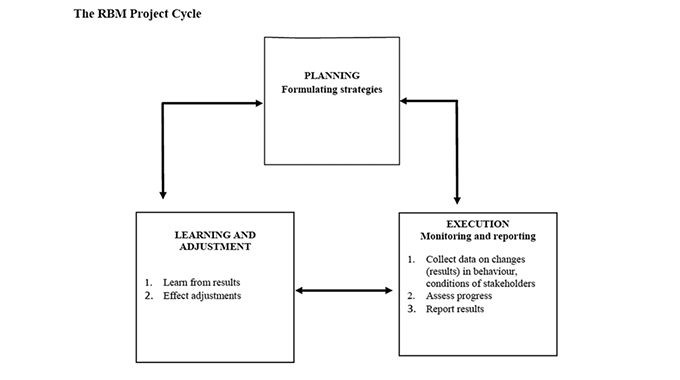RBM for consistent learning, improvement for project success

Rudo Grace Gwata-Charamba Correspondent
In the light of globalisation, increased demands from stakeholders, as well as the evolving and complex nature of development, the Results Based Management (RBM), approach has become the strategy of choice for most of the public sector.
RBM is an integrated, iterative and participatory management strategy that has proved to be an ideal tool for developing excellence in service and project delivery.
Key to its success is the maximum participation of stakeholders, throughout the management cycle, in defining realistic expected results and assessing risk while decision-making is strictly informed by evaluative evidence.
All attention is focused on the achievement of such results with progress, aside from the state of assumptions and risks within the environment, consistently and objectively assessed then candidly reported on.
Such reporting on internal and external risk areas, enhances continuous learning and proactive decision-making.
RBM processes facilitate the adoption of strategies and work plans to deal with change, while building on the capacity of the related entities.
In addition, progress towards the achievement of results is continuously monitored with all the details documented to facilitate learning, a practice that is valued highly among stakeholders for its capacity to promote success.
Learning is about determining what works and what does not, followed by the necessary adjustments.
It implies continuously increasing stakeholder knowledge by integrating identified best practices, lessons learned plus new or changed information into both present and future decision-making.
The best practices are replicated and expanded while lessons learned are used to guide adjustment to current execution and future design.
Explicitly, learning helps to improve results from existing initiatives and enhances the capacity of entities to make quality decisions regarding future plans.
The capacity to learn and adapt from performance information, a pre-requisite for effective service and programme delivery, can thus be effectively built through the implementation of RBM, with continued learning from both success and failure being among its basic principles.
It can be argued that such capacity to learn would be highly beneficial for most development stakeholders in Zimbabwe where there is always a strong predisposition to completely dump an initiative that is perceived to be performing badly, sometimes together with its implementers.
That is, mistakes are forbidden and thus no learning from them.
Consequently, shortcomings are repeated primarily due to the lack of a record of the lessons learned for guiding subsequent decision-making.
Institutionalisation of RBM can help to address this limitation.
As initiatives are executed, RBM underscores continuous learning and improvement through consistent monitoring and reporting.
Monitoring entails tracking progress and managing business based on solid evidence and in a way that maximises the achievement of results.
The use of indicators strengthens the capacity of future monitoring and learning.
New programming and project identification draw on the results of monitoring as part of a structured process of feedback and institutional learning.
Strategies and work plans are then adapted to advance successes, avoid making the same or similar mistakes and also build on knowledge regarding project execution and service delivery.
Performance information, derived from monitoring processes, is used to learn and adjust, as appropriate, towards improving the efficiency and effectiveness of services or projects and programmes.
The information depicts the project’s effectiveness and highlights challenges, inefficiencies and poor results and thus relates to both success and failure.
For enhanced quality and credibility, the information ought to be derived, as far as possible, from both quantitative and qualitative data.
It is often argued that the primary purpose of RBM is to improve efficiency and effectiveness through organisational learning and also to fulfil accountability obligations through performance reporting.
For that reason, organisational learning, a key principle of Public Sector Management, is regarded as the principal motivating factor for the adoption of RBM approach by highly effective organisations.
The approach contributes to organisational learning as well as the global knowledge base for the successful achievement of development goals.
Ultimately, a learning culture is created and nurtured. In such a culture, continuous acquisition of knowledge and capabilities is strongly encouraged while failures or mistakes when trying new things are not punished.
On the contrary, stakeholders are keen to learn from those mistakes with the aim of ensuring that they are never repeated.
A learning culture also demands effective communication among stakeholders to consistent support improvement.
The RBM cycle refers to the ongoing process of doing, learning and improving.
Learning, from both positive and negative information, takes place throughout the project cycle with knowledge gained from monitoring and reporting being at the core of organisational learning processes.
Performance information is used to guide decision-making in adjusting current projects or design new ones by eliminating elements that do not work. This connotes a limited loss of resources due to early detection and timely correction of issues while providing information for future performance improvement.
The information is channelled to decision-makers through nested feedback loops from continuous performance assessments, a process that creates opportunities for learning at the individual, group and system levels.
Management decision-making processes are accordingly informed by valid and reliable information, resulting in greater efficiencies and effectiveness.
Also, candidly reporting on performance facilitates the creation and reinforcement of an effective platform for learning. However, most implementers tend to focus on output information, relating to goods and services produced, which is perceived to be less complex than that on changes in behaviour of conditions (results).
Consequently, information on lower level results is used, leading to reducing utility of the assessments.
The many different groups of stakeholders learn from experience, as new insights to help improve work processes emerge and guarantee success in the management of initiatives.
There is constant communication comprising feedback to stakeholders on achievements, what has been learned, and challenges encountered.
Strategies that include promoting information and knowledge-sharing structures; encouraging stakeholders to identify and communicate good practices and lessons learned are used to enhance such learning.
Such effective sharing and use of timely, relevant, complete and accurate performance information, among stakeholders, for decision-making, learning and improvement are some of the defining characteristics of RBM.
Fostering learning creates an environment where both what works and what does not are valued and acted upon with a bias towards what does not work.
That is, stakeholders learn from the results while continuously improving
To guarantee effectiveness, it is thus essential for every organisation to create and nurture a learning which entails, learning from both success and failure, providing for time to learn as well as supporting all learning processes.
Strategies to support learning include facilitating access to information, emphasising and valuing learning plus accommodating experimentation.
Information can be accessed through publications, workshops and retreats as well as encouraging stakeholders to actively participate in communities of practice (CoPs), among other means.
Learning thus provides information and facts that, when accepted and internalised, become invaluable knowledge.
Both best practices and lessons learned are documented and systematically used to inform decision-making towards improving service and project delivery.
That is, whether the interventions are successful or not, results information is used to foster learning and to support constructive and proactive management decision making.
Sadly, in most cases stakeholders get disheartened with project or programme failure to the point of discarding all information relating to the experiences and thus losing invaluable opportunities for learning and improvement.
Experiential evidence shows that such was the case in Zimbabwe with programmes encompassing ESAP, ZIMPREST and ZIMASSET.
The tragedy is that opportunities to replicate best practices are lost or shortcomings may be repeated, thus reducing chances of improvement and successful implementation of new programmes. Incorporating the concept of learning into the core function of each programme through an effective learning and information sharing system can prove worthwhile for purposes of improving service and project delivery.
Full institutionalisation and effective implementation of RBM can help to create and nurture a learning culture, improvement and successful programming.
Dr Rudo Grace Gwata-Charamba is an author, development Project/ Programme Management Consultant and Researcher with a special interest in Results Based Management (RBM), Governance and Leadership. She can be contacted via e-mail: [email protected]










Comments